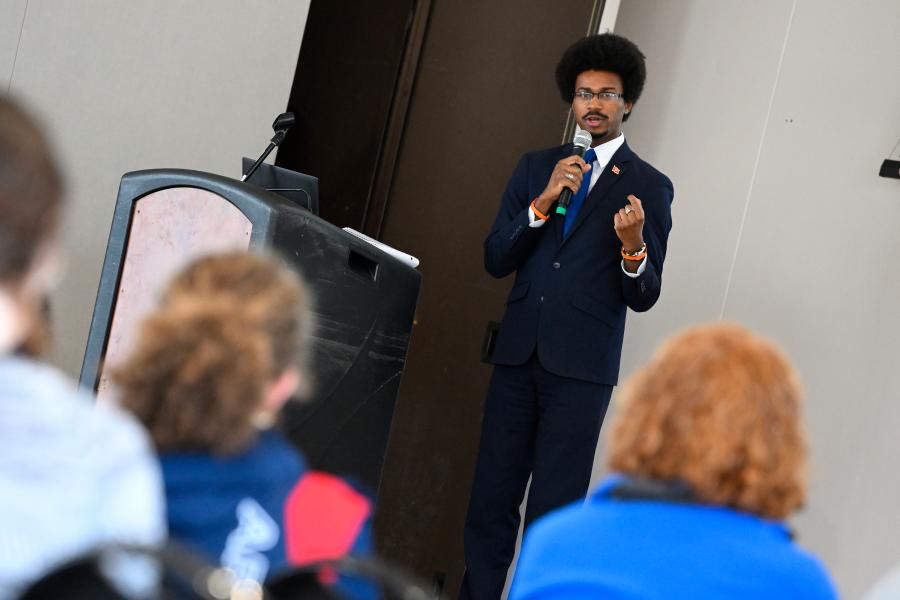Tennessee state Rep. Justin J. Pearson called on academics to work side-by-side with community partners and stay present in their fight for environmental justice in a Grand Rounds address to the Johns Hopkins University's Department of Environmental Health and Engineering on Friday, March 8. The department invites monthly speakers to its Grand Rounds series to speak on a range of environmental science topics.
"For those of us who are engaged in this fight, who want to help communities, going in with humility and showing up with sincerity is really important. But then use your power, use your privilege to go to people who have been elected who have control over resources, and advocate on behalf of communities," said Pearson, whose remarks also were delivered to audience in the Glass Pavilion on the Homewood campus. "The separation between knowledge creation and those who need the knowledge in order to create a transformative society must be bridged."
A longtime environmental activist, Pearson represents District 86 in the Tennessee General Assembly. He and fellow representatives Justin Jones and Gloria Johnson rose to national prominence when they staged a protest for gun reform on the Tennessee House floor in the wake of a school shooting in 2023 that killed three 9-year-olds and three adults. Republicans responded by expelling Pearson and Jones, both Black, citing violations of house rules on decorum. Johnson, who is white, was not expelled. Local authorities in Memphis and Nashville reinstated Pearson and Jones several days later, and Pearson went on to be reelected with nearly 94% of the vote.
In his address at Hopkins, Pearson underscored his remarks by tracing the correlation between the historical practice of redlining in Memphis, persistent segregation in the city, the density of toxic release inventory facilities in southwest Memphis, which is predominantly poor and Black, and decades of health problems in the area. Cancer rates in Pearson's district are more than four times the national average.
"The 'we can't breathe' slogan still exists for our community," Pearson said. "Because 'we can't breathe' isn't just about police brutality. It's about the slow lynching and the slow violence of polluters in our community quite literally taking our breath away."
In 2020, opposition to a proposed crude oil pipeline set to run under southwest Memphis galvanized the community. Pearson founded the grassroots group Memphis Community Against the Pipeline, now Memphis Community Against Pollution. Partnering with researchers with the Center for Applied Earth Science and Engineering Research at the University of Memphis, the group exposed the danger the pipeline posed to the city's aquifer, which supplies all its drinking water. The pipeline was ultimately canceled.
"When you walk in together, it changes the way that people in power view the situation," Pearson said.
But the effort doesn't end when research concludes or one battle is over, Pearson said. He urged the crowd to advocate for environmental justice over the long term through authentic community relationships.
"What is our responsibility as PhDs? What is our responsibility as professors? What is our responsibility as politicians? It is to make sure that those who are least responsible for the problem that we are seeking to fix are not burdened with the entire responsibility of fixing them," he said. "Bring your power to the places that have been disempowered, to create change. That's the work."
Tagged environmental health








